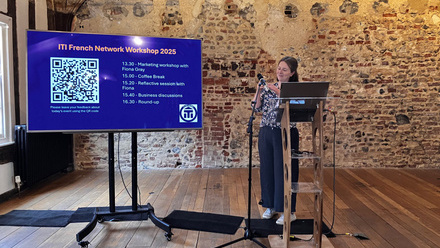Welcome on board
Claire Cox looks back at her time as an ITI Board Member, and explains why anyone who’s interested in standing should seriously consider doing so.
Earlier this year, personal commitments meant that I stood down from my role on the ITI Board, rather than standing for election for a further three-year term as is customary. I thought long and hard about my decision, since I thoroughly enjoyed my time on the board, but there comes a point when you have to put the rest of your life first – none of us are superheroes, much as we’d like to think we are!
While I wouldn’t want to give anyone the impression that being on the board is an onerous task, it does require commitment and time. I was flattered to be asked by a previous chair to consider standing in the first place and felt I did have something to contribute after all my years in the profession. After all, that’s really what it’s all about, isn’t it? Giving back and helping to move the profession forward. But to do anything properly, you do need to devote time and energy to it, and time is something I’ve been perilously short of over the past two and a half years.
What I’d like to do as a parting gesture is to encourage others who may have considered standing but weren’t really sure what it entailed (or whether they were the ‘right kind’ of candidates), or even those who haven’t considered joining the board but might be persuaded once they know what it’s all about.
Getting a representative range
The fact is there really isn’t a ‘right kind’ of candidate: the board aims to attract members from across the board (sorry!). To be eligible to apply, you have to have been an ITI member for two consecutive years – it’s as simple as that. It’s so important to have a range of people: translators, interpreters, different ages, genders (not always easy in a female-dominated profession), varied professional experiences and qualifications.
The call for nominations will state whether the vacancies are for a voting member (all individual membership categories except affiliates) or non-voting (affiliates and corporates). The board must have at least four voting members and at least one non-voting member or Corporate member. Agencies play a huge role in many translators’ lives, after all – and that perspective is essential. Other than that, anyone can stand and play their part in running the Institute.
You also don’t have to be an outgoing, front-of-house kind of person. I’m very much a back-room girl, preferring to work behind the scenes, and there’s room for both introverts and extroverts. The most important thing is to be able to speak your mind and say what you think. Your contacts and experiences from previous jobs or studies may come in useful too – but you won’t necessarily know what’s needed until a situation arises. The ability to keep an open mind and listen is also key.
Board Members do receive an attendance fee for going to in-person meetings, and attendance at conferences and seminars may also be funded in return for ‘room angel’ duties and generally being on hand as an official ITI representative.
A whole lot to gain from the experience
So why should you consider joining the board? Quite apart from what the Institute has to gain from your particular skill set, what’s in it for you?
I loved the camaraderie of meeting with my fellow board members, especially as many of us work from home. It was particularly enlightening to meet up with colleagues I knew of or had met in online forums, but who were interpreters or worked in agencies. We all tend to see things from our own perspective, but it’s fascinating to realise that interpreters or translation companies have a different take – equally valid, but different. And we are the Institute of Translation and Interpreting, when all is said and done, so we need that breadth.
When we discussed whether to increase subscriptions at the start of the year, for example, we had a lengthy and riveting debate.The sensible financial decision, in view of rising costs all around, and the fact that subs hadn’t risen at all for the past few years, would have been to propose an increase, at least by a small amount. However, a number of us felt strongly that many colleagues had been hit so hard by the double whammy of Covid and Brexit that it would cause significant hardship and alienation to go down that route. We put it to the vote, as always, and agreed to leave rates the same. In view of what came afterwards, with the conflict in Ukraine and the huge hike in energy bills, to say nothing of the ongoing political upheaval in the UK, I’m very glad we did.
It’s also great that ITI encourages members in other countries to stand for election, since it’s important for the Institute to get that international perspective. Airfares from Spain or Portugal (where two of our board members are currently based) are no more than train fares or mileage costs within the UK in many cases, and the last few years have shown, if nothing else, that Zoom meetings can be extremely effective. Every other meeting is held via Zoom in any event. Ultimately, however, nothing can replace the brainstorming and enthusiasm engendered by an in-person meeting. I really enjoyed my visits to Milton Keynes every couple of months to try and put the ITI world to rights with like-minded colleagues.
The governance side of being a Board Member (or Director of the Institute, if you like) is something else I hadn’t previously really given much thought to. Before your first meeting proper, you are sent a pack of governance material, articles, code of conduct and so on, to read, digest and inwardly assimilate; then you have a chat with the company secretary, who explains it all in the simplest possible way – essential for those of us who haven’t been involved with corporate governance at all.
The role of company secretary is outsourced to a company specialising in governance matters for membership organisations, and it is their job to make sure that our elections, rules, articles and so on remain strictly within the law. ITI also employs an accountant to do the same on the financial side. It goes without saying that the board must remain above board…(Oops, there’s that word again!) All these aspects were surprisingly interesting – and it’s reassuring to know that our organisation is in such safe hands, from our estimable chief executive through the fabulous office team to these specialist roles.
Elections of new members, the various committees, and projects like the new website, conferences, events, continuing professional development, qualifications and equality, diversity and inclusion are all subject to the same forensic attention to detail.
Recognition and a new perspective too
One last, and rather unexpected, bonus of being a Board Member was the heightened recognition not only from colleagues but also from friends and people outside the profession. People are impressed that you’ve made the effort to join the board, to put yourself up for election – and to take the associated knocks too.
There are always those who see you as fair game when you put your head above the parapet…As with any form of networking, mixing with people from different parts of the profession may even lead to work recommendations. I’ve recommended colleagues I got to know better via the board because I’ve been impressed with their knowledge, conscientious approach and meticulous attention to detail – not that that’s a reason to stand!
Being on the board quite simply gives you a whole new perspective: instead of muttering to yourself ‘Why can’t they just do this…’, or ‘I wish they’d just get on with it…’, you realise that the board is representing the interests of over 3,000 individual members, not all of whom have the same needs. We have to take our time to do what’s right for the majority of members, but also, and very importantly, for the profession as a whole. We are there to represent members, certainly, but also to interact with outside bodies on members’ behalf.
With all that responsibility comes the need to devote a certain amount of time, however – and I truly felt I couldn’t continue to put my heart into the board with everything else going on in my life just now. I’m sure that this year’s crop of new members (Lloyd, Fiona and Agata) will do a brilliant job alongside the existing members, and it was lovely to meet them properly at the ITI Conference in Brighton. In fact, I so enjoyed the hectic pace of being a room angel and being on the back-stage team at a real- life conference again, I felt rather sad that I’d stepped down. But it was definitely the right decision for me at this stage of my life as part of the sandwich generation. I have two granddaughters, one in the US, and a new grandson born in September, and I also need to be there for my elderly father, so I’m sure I’ll have plenty to fill my time outside work.
And as I said to my fellow board members, I’m still here and won’t hesitate to get in touch if I have any ideas or comments – once a board member, you always know what it’s like on the other side of the fence. I’ve also been asked to join the Fellowship Committee, so I’ll still have a very tentative finger in the ITI pie. I just hope I never lose the ability to see all those points of view. So, are you tempted? Go on, put yourself forward – you’ll never know unless you try.
This article first appeared in the January-February 2023 edition of ITI Bulletin.






